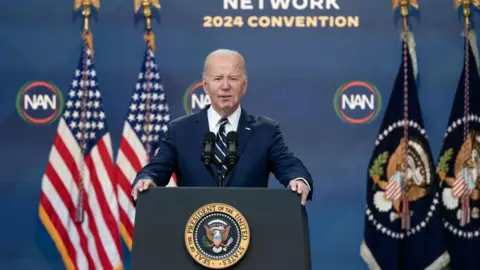US President Joe Biden has expressed anticipation that Iran will launch an attack on Israel “sooner than later,” amid escalating concerns of Iranian retaliation following an airstrike on Irsan’s Consultae in Syria that claimed the lives of senior commanders on April 1. Biden cautioned Tehran against assaulting the nation, emphasizing the United States’ commitment to Israel’s defence.

Meanwhile, the Ministry of External Affairs has recommended that Indians refrain from travelling to Iran and Israel given the current situation in the region. Along with India. multiple other countries including France, Poland and Russia have issued warnings advising their citizens to avoid travel to the broader region. Germany has asked its citizens in Iran to leave the country.
The US State Department said that diplomats and their families in Israel cannot go outside Tel Aviv, Jerusalem, and Beersheba.
President Joe Biden’s Remarks
Israel has not officially acknowledged responsibility for the attack on an Iranian consulate in Syria, although it is widely suspected to have been involved.
The country asserts its readiness to protect itself, while President Biden delivered a stern message to Iran: “Don’t.” Biden further affirmed, “We are dedicated to Israel’s defence. We stand by Israel,”. “We will assist in defending Israel, and Iran will not prevail.”
Speaking to reporters at the White House after an event on Friday, Biden said he didn’t want to divulge secret information but expected an attack “sooner, rather than later“.
Following Biden’s remark, White House spokesperson John Kirby acknowledged the concerns regarding Iran’s potential attack on Israel as a “genuine and credible threat.” However, he declined to specify a timeframe. He stated that the United States did not foresee any imminent attacks from Iran or its proxies on its forces but emphasized ongoing assessments of the country’s posture in the region. “It would be unwise not to evaluate our position in the region to ensure our readiness,” he further commented.
Growing volatility in West Asia
Since April 12, Israel has remained on high alert for retaliation from Iran and its proxies following an attack on Iran’s embassy in Damascus, Syria, last week. The assault on April 1 resulted in the death of one commander from the Iranian Revolutionary Guard Corps’ overseas Quds Force and six other officers. Although Israel has not admitted responsibility, Iran’s supreme leader, Ayatollah Ali Khamenei, declared that it “must be punished” for what he deemed an assault tantamount to an attack on Iranian territory.
![]()
Israel announced on April 12 the opening of a new crossing for aid trucks to access northern Gaza. However, Reuters reported that the United Nations has observed limited progress in reaching besieged civilians due to “persistent distribution difficulties.” In conflict-ridden Gaza, over 1 million people are confronting the threat of starvation. Additionally, Israeli offensives have resulted in the deaths of over 33,600 Palestinians and injuries to more than 76,200.
On April 12, according to AP, many upset Israeli settlers entered a Palestinian village in the Israel-occupied West Bank. They shot and set houses and cars on fire, resulting in the death of one Palestinian man, Jehad Abu Alia, aged 26, and injuring 25 others. Palestinian health officials report that since the conflict began in October last year, over 460 Palestinians have been killed by Israeli forces in the West Bank.
Israeli Prime Minister Benjamin Netanyahu has met members of his war cabinet amid the warnings. Some Israelis said they were not worried about a potential Iranian attack. “We’re aware of being surrounded by enemies in every direction – south, north, east, and west,” said Daniel Kosman to AFP news agency while at a market in Jerusalem. “We’re not fearful, I assure you. Just look around: people are going about their business.”
![]()
Also Read: Iran Elections 2024: Iranians to vote for first time since 2022 nationwide protests